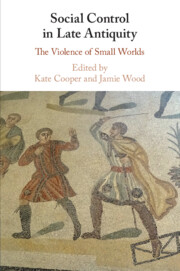Book contents
- Social Control in Late Antiquity
- Social Control in Late Antiquity
- Copyright page
- Contents
- Contributors
- Preface and Acknowledgements
- Abbreviations
- Introduction
- Part I Women and Children First
- Part II ‘Slaves, be subject to your masters’
- Part III Knowledge, Power, and Symbolic Violence
- Chapter 8 John Chrysostom and the Strategic Use of Fear
- Chapter 9 The Fear of Belonging
- Chapter 10 Words at War
- Chapter 11 Of Sojourners and Soldiers
- Chapter 12 Coercing the Catechists
- Part IV Vulnerability and Power
- Bibliography
- Index
Chapter 9 - The Fear of Belonging
The Violent Training of Elite Males in the Late Fourth Century
from Part III - Knowledge, Power, and Symbolic Violence
Published online by Cambridge University Press: 18 September 2020
- Social Control in Late Antiquity
- Social Control in Late Antiquity
- Copyright page
- Contents
- Contributors
- Preface and Acknowledgements
- Abbreviations
- Introduction
- Part I Women and Children First
- Part II ‘Slaves, be subject to your masters’
- Part III Knowledge, Power, and Symbolic Violence
- Chapter 8 John Chrysostom and the Strategic Use of Fear
- Chapter 9 The Fear of Belonging
- Chapter 10 Words at War
- Chapter 11 Of Sojourners and Soldiers
- Chapter 12 Coercing the Catechists
- Part IV Vulnerability and Power
- Bibliography
- Index
Summary
This chapter explores the role of violent pedagogic practices in the formation of elite males in the later Roman Empire. It draws on the work of the sociologists Pierre Bourdieu and Basil Bernstein to inform an analysis of education’s key role in social and cultural reproduction. Focusing on selected writings of two late-fourth century contemporaries, Libanius and Basil of Caesarea, the chapter suggests that violence of various sorts played a pivotal role in the formation of elite male subjects, whether in the school of the teacher of rhetoric (Libanius) or in monastic training (Basil). Violence played a pivotal role in both the form and content of late Roman education – as well as suffering and inflicting violence on others, students read about and performed violent narratives. The considered cultivation of feelings of fear was viewed as maintaining the pedagogic order and helping to form ideal masculine subjects. Through such experiences and by reflecting on them in pedagogic contexts, students learnt to understand the parameters of legitimate and illegitimate violence, enabling them to protect themselves and their community in a competitive social context.
Keywords
- Type
- Chapter
- Information
- Social Control in Late AntiquityThe Violence of Small Worlds, pp. 188 - 212Publisher: Cambridge University PressPrint publication year: 2020
- 1
- Cited by



